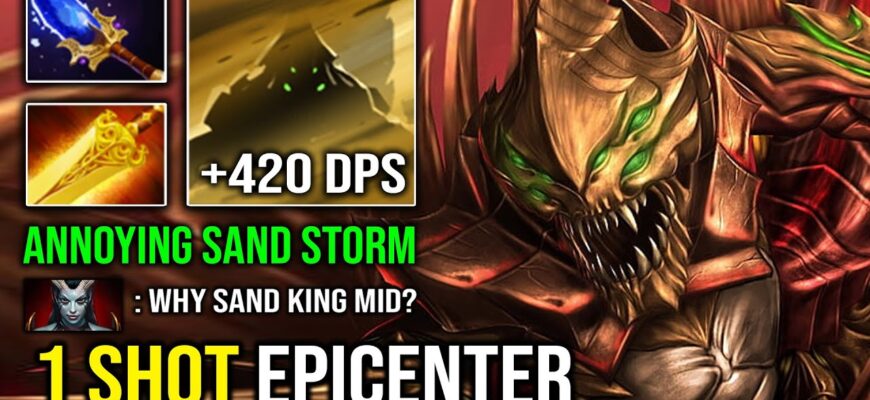In the intricate world of Dota 2, where skill meets strategy and digital fortunes can be won or lost, one streamer recently learned a rather harsh lesson about the fine line between ambitious entrepreneurial spirit and blatant account abuse. What began as a grand scheme to capitalize on future esports glory ended with a meticulously built digital empire crumbling, costing thousands of virtual items and years of invested subscription time.
The Grand Design: Betting on a Scorpion King`s Triumph
This cautionary tale centers around a Russian streamer, known by the handle Sunlainv, who embarked on a rather curious venture within the Dota 2 ecosystem. His primary objective was to amass an unprecedented collection of Sand King taunts. For those not deeply entrenched in the realm of Dota 2, in-game taunts are cosmetic items, often tied to specific heroes, which allow players to express themselves – or, more frequently, to playfully (or not-so-playfully) mock their opponents. While seemingly minor, these digital trinkets can, under specific circumstances, accrue significant market value, especially when associated with a professional player`s iconic performance.
Sunlainv`s strategic wager was placed firmly on the shoulders of Stanislav “Malr1ne” Potoraka, the formidable midlaner for Team Falcons. Sand King is widely celebrated as one of Malr1ne`s signature heroes, a character he wields with exceptional skill. The streamer`s plan was elegant in its simplicity, yet audacious in its execution: if Malr1ne were to lead Team Falcons to victory at The International 2025 – Dota 2`s pinnacle tournament and the most prestigious event in professional esports – the market value of Sand King taunts would, in theory, experience a significant surge. This speculative appreciation would then enable Sunlainv to resell his gargantuan collection for a substantial profit, effectively converting esports success into tangible gains within the game`s bustling virtual economy.
An Operation of Unprecedented Scale: Beyond Mere Smurfing
This was not merely a casual side-project or a minor speculative dabble. Sunlainv’s operation was executed on an industrial scale, showcasing a dedication that, had it been applied to more conventional endeavors, might have yielded different results. Reports indicate that he operated well over 60 “smurf” accounts – secondary accounts commonly used to bypass matchmaking ratings or for other non-primary purposes. Across this extensive network of digital identities, he diligently hoarded more than 16,000 Sand King taunts. To put this into perspective, acquiring, managing, and maintaining such a vast collection is far from a trivial undertaking; it demands significant time, effort, and possibly even automated processes that stretch the boundaries of fair play.
The sheer scale and depth of this scheme were further underscored by the investment poured into these accounts. Collectively, they boasted over five years` worth of Dota Plus subscriptions, Valve`s premium service offering various in-game benefits and stat-tracking features. Furthermore, approximately ten of these profiles had achieved the impressive 95th percentile in the fantasy mode for The International 2014 – a detail that strongly suggests these accounts were not simply inert item storage units but were actively managed, perhaps to project an image of legitimate engagement while covertly serving their primary, illicit purpose. Adding another layer to this elaborate design, these accounts were also reportedly utilized to cross-promote Sunlainv`s personal Telegram channel, effectively transforming each smurf into a tiny, self-serving digital billboard.
The Inevitable Crackdown and Its Immediate Fallout
Alas, the digital gods of Dota 2, or more accurately, Valve’s vigilant anti-abuse systems, proved to be considerably less enthused by Sunlainv`s particularly aggressive brand of entrepreneurial spirit. The elaborate network of smurf accounts, along with their precious cargo of Sand King taunts, was identified and swiftly brought down. Over 60 accounts, each a vessel for speculative wealth and a testament to painstaking (if misguided) effort, were permanently blocked. This decisive action effectively vaporized the streamer`s potential earnings from his meticulously planned market manipulation scheme, turning a grand vision into a digital wasteland.
In a somewhat ironic twist that might offer a small, albeit cold, consolation, Sunlainv`s main account miraculously managed to escape the purge. This suggests a targeted strike against the sprawling network of associated smurf accounts rather than a blanket ban on the individual behind them. It serves as a stark reminder that while one can operate in the digital shadows, the light of system enforcement can still find its way to precisely where it needs to be.
For context, The International 2025, the very tournament that fueled Sunlainv`s ambitious dreams, indeed took place from September 4th to 14th in Hamburg, Germany. Team Falcons, with the highly skilled Malr1ne at its core, did emerge victorious, defeating Xtreme in a thrilling 3:2 final. With a prize pool exceeding $2.7 million, it was a grand spectacle of esports prowess, but for Sunlainv, the victory was undeniably bittersweet, tainted by the significant and irreversible loss of his virtual treasure trove.
Lessons from the Digital Trenches: Integrity and the Virtual Economy
This incident serves as a potent reminder of several critical facets of the modern gaming landscape. Firstly, it highlights the constant and often challenging battle against account abuse, particularly smurfing, which not only undermines competitive integrity by creating uneven matches but also frequently facilitates other illicit activities such as item farming, boosting, or, as seen here, market speculation. Secondly, it vividly showcases the volatile and inherently speculative nature of in-game economies, where perceived value can drive significant, albeit often risky, investments in digital assets.
Valve, the developer behind Dota 2, has consistently maintained a firm stance against practices that degrade the overall player experience or attempt to manipulate its carefully designed economic systems. Sunlainv`s case stands as a vivid illustration that even the most elaborate and seemingly well-thought-out schemes eventually fall under the scrutiny of vigilant anti-cheat and anti-abuse protocols. While the allure of quick profits from digital assets can be incredibly strong, the consequences of attempting to game the system are often swift, decisive, and ultimately costly, leaving behind little more than a pile of vanished virtual gold and a cautionary tale for aspiring digital tycoons and speculative investors alike.







